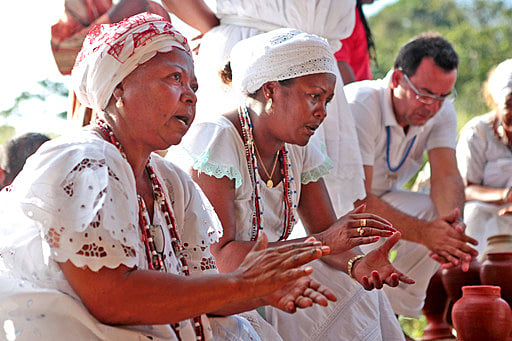With the backdrop of the heavy drums that sound off the call to Xangô, the deity representing justice in Afro-Brazilian religions, leadership of the peoples of the “terreiro” – the sacred grounds where their ceremonies take place – launched on Wednesday (17th) a manifesto calling for the ousting of president Bolsonaro and vice-president Mourão. Their movement joins a growing mobilization seeking to defend life and democracy.
The document was signed by over ones thousand entities from the black movement, sacred ground communities and other religious leaders. It denounces the ongoing racist hate speech coming from the president and the absence of health policies in the midst of the covid-19 pandemic. According to the manifesto, it’s mainly the black and poor population of the country that is more vulnerable during the crisis.
These entities are also calling out the government’s silence and inaction on the murders of young, poor black men, and the constant attacks on culture and Afro-Brazilian religions, including by Sérgio Camargo, the current president of the Palmares Foundation, which supposedly works to further black causes.
“We who follow traditions with African roots, who are left leaning, we have the obligation to take a stance in relation to the ongoing economic, ethical, moral and political chaos in our nation. We can no longer stay silent in the face of the aggression promoted by a president fueled by hate and a death wish,” the document says, which considers that ousting Bolsonaro and Mourão “the only way to protect ourselves and keep advancing in the direction of a society without racism.”
The manifesto was released live via the Landless Worker’s Movement’s (MST) social media accounts and included a debate about the current political landscape and its impacts on life, religion and Afro-Brazilian culture.
“We cannot remain silent in this moment, it is one of the most tragic episodes ever in our history. Our country was built with the blood of our ancestors, the blood of indigenous communities, that is why we called for this assembly and created this manifesto,” said the national coordinator of the Center for Africanism and Afro-Brazilian Resistance (CENARAB), Makota Celinha, one of the initiative’s organizers.
After the manifesto was read by Nilma Limo, indigenous leader Sônia Guajajara related that more than 300 natives have died from the novel coronavirus and 5 thousand have been infected, according to the most recent data. She adds that it is not only the virus causing the deaths, but also policies by the Bolsonaro government which are leaving their people in despair, systematic racism and the capitalist system.
“It is not only due to the disease that people are dying here in Brazil, we are also dying because of necropolitics, so we together need to strengthen all our struggles and collective voices that are shouting Bolsonaro and Mourão out. We must also break from other chronic conditions like the current economic model, which is totally centralized, predatory and oppressive,” declared Sônia.
Educator and professor emeritus at the Federal University of Minas Gerais (UFMG), Nilma Lino, also endorsed the coming together of the black, indigenous and peasant struggles under the banner of “the pain that unites us”, to defend a “radical democracy”. During the government of Dilma Rousseff, Lino was the minister of Racial Equality Policies, which was disbanded by the Bolsonaro administration.
“A radical democracy is one that is anti-capitalist, anti-racist, anti-patriarchy, anti-lgbtq-phobic, anti-neoliberal and anti-facist, so we have to unite and this manifesto, I believe it lends to the notion that we can unite in a radical democracy, bringing down all those who since taking power have been denying us the democracy we built ourselves”, expressed Nilma.
An analysis of the capitalist crisis, which in turn generated the environmental and health disasters stemming from the novel coronavirus, was made by João Pedro Stedile, who spoke on behalf of MST and the Brazil Popular front, which is also leading the “Fora Bolsonaro” (Bolsonaro Out) mobilization.
For the social movements that comprise the front, their main path is clear, something that is laid out in the manifesto. The solution is a post-capitalist project, which begins by bringing down the current administration.
“A vision that establishes equality among all Brazilians who live by working hard. In order for us to debate this post-crisis project, as is signaled in the manifesto that you all are publishing today, the first step is to change the government. Therefore, Fora Bolsonaro is a necessary condition for the survival of the Brazilian people, if we don’t bring down this government we may reach 100,000 dead”, reiterated Stedile.
Resistance against this “government of death” was led by CENARAB leader, Makota Celiinha, who was celebrating the one year anniversary of the 1st Gathering of Religions with African Roots in Belo Horizonte, in the state of Minas Gerais.
“It is up to each and everyone of us from the African tradition, illuminated by our ancestors to immediately build a scenario that propels us forward. For me, this scenario is one of struggle against the current necro-government, the struggle for “Fora Bolsonaro and Fora Mourão”. We need to build this network of people with good intentions, because silence also leads us to death. We need to beat the drums so that this will end and we can break through this sphere of death that is encircling us. Our ancestral identity will unite us at this moment”, she concluded.




